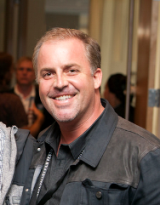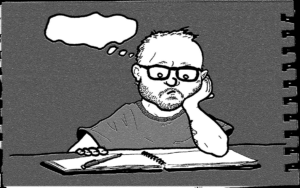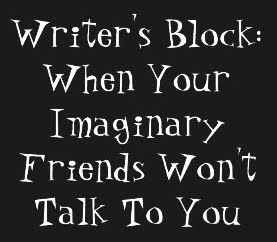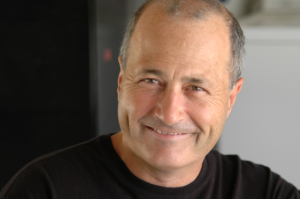Occasionally we take a break from showcasing scripts, and focus on the masterminds behind the words. Because there’s nothing better than hearing from successful members of “the craft”, and absorbing the sage words they have to tell.
Today, we are happy to publish an interview between Anthony Cawood, and Danny Stack, a UK based screenwriter and director whose TV credits include Eastenders and Doctors, kids’ TV shows The Octonauts and Thunderbrids. He also co-wrote and co-directed the kids’ feature Who Killed Nelson Nutmeg (just recently released). As if that wasn’t enough, Danny also produces the UK Scriptwriters Podcast, blogs about the industry and has released a book to help aspiring screenwriters break in, entitled: The UK Scriptwriter’s Survival Handbook.
Q: Could you give me a little bit of background on how you got into screenwriting?
A: I was working as an assistant in Channel 4’s comedy department in the late 90s, when they were making shows like Spaced, Black Books, Chris Morris etc. It was a great time for the dept and the channel, and I got to read a lot of scripts that were submitted. I always had a fascination with screenwriting, so my time at C4 just added fuel to the fire, and I realised it was what I wanted to do above all else. My bosses thought I was nuts, but I gave up the day job in 1999 and went freelance, trying to become a scriptwriter. I was nuts!
Q: How did you get into Channel 4 as an assistant in the first place?
A: I came over from Ireland in 1994 and got work as a media temp (which I highly recommend as a way of getting ‘in’ to the biz). I got a temp job at C4 that was meant to last 2 weeks but I stayed 2 years! It was in the Viewer Enquiry dept; taking complaints and enquiries from the general public. I then took a year out to go traveling, and when I returned I knew I wanted to work at C4 again, so I got a temp job there, and saw a job was available in the comedy dept, so I jumped at it, and got it!
Q: You’ve been writing scripts for 10 years, how did you break in with your first one – The Amazing Adrenalini Brothers (or was there something before that)?
A: When I went freelance, I initially worked on a couple of TV shows as part of the production crew (Black Books, Ali G) but then decided to fully focus on my writing (paying the bills via script reading/script editing). Between 2000-2004, I read loads of scripts and developed my own writing portfolio. My first break was BBC’s Doctors as they read one of my spec scripts, liked it and invited me to write for the show. That was my first commission, but it ended up on TV just after my episode of The Amazing Adrenalini Brothers. The Adrenalinis was my first commission in kids’ TV, and it came about as I met Nick Ostler (the co-creator of the Adrenalinis) at a short film screening, and he just had The Adrenalinis commissioned by CiTV. ‘Know any good animation writers?’ he asked. ‘Yes, ME!’ I replied, having never written for animation previously (!).
Q: Your early career is primarily in UK TV, how did you get in and get regular work?
A: BBC’s Doctors was my way in. I got my first agent and she sent one of my specs to the person responsible for hiring new writers on the show. She read my script, liked it, and invited me to pitch ideas for the show. I wrote 2 episodes in total, but I got frustrated by the commissioning process, often waiting long periods to hear if an idea was accepted or rejected, or worse ‘spiked’ (to be used at a later but indeterminate point). But writing for Doctors got me the opportunity to write for EastEnders. You have to write a trial episode of the show to get selected and on my first try, I was rejected. A year later, I tried again, and got accepted. I wrote 2 episodes of EastEnders, and was lined up for more, but then a new producer came on board and did an overhaul of the writers, and I was out (and gutted!).
Q: You’ve written for Children’s TV too, what are the differences when writing for a younger audience?
A: The main difference is tone. All the usual screenwriting craft applies. In fact, even more so, as kids are very sophisticated and watch a lot of story so they can tell if something is boring, predictable or not very good within seconds.
Q: Is it any easier to break in to Children’s TV?
A: In a way, yes, as there’s less ego and status involved in Children’s TV, so a new writer can find it quite welcoming, regardless of whether they’ve got previous experience. My top tip would be to attend the Children’s Media Conference (http://www.thechildrensmediaconference.com/ every year in Sheffield) as it’s a who’s who of the UK biz, so a great way to network and schmooze your way into writing for kids’ TV.
Q: You’ve taken the role of Writer/Director on some of your shorts, was this to maintain artistic control, expand your experience, or something else?
A: All of the above! I realised a director gets all the credit and the writer is largely ignored. I didn’t want that to happen with some of my passion projects. I was always interested in directing anyway, so I decided to make shorts to see if I was any good, expand my experience, and have some fun! I made a very ambitious supernatural drama called Origin (http://originshortfilm.co.uk/), and spent a lot of money, but it was essentially my film school and I learned a lot. The film did well on the festival circuit and won Best Horror at the London Independent Film Festival.
Q: Would you advocate writing/making short films, why do you think they are useful?
A: I would recommend EVERYONE try making at least one short film, homemade or otherwise (official funding etc). I know a lot of writers who aren’t interested or don’t think they have the suitable mentality/personality but you get a lot of help when you’re directing a film (the cameraman, the sound, the actors, etc) so it’s not as daunting as you think. But giving it a go is great just to see how the process is done, and gives you added appreciation for those who do it on a regular basis.
Q: Did you start with short scripts and then move to features with Nelson Nutmeg or have there been other feature scripts so far unproduced (‘The Good Guys’ for example)?
A: When I started out, I wrote feature spec scripts & TV spec scripts, then short scripts. All of this helped to build my writing portfolio. Getting a feature film made through the industry is a real achievement (on average, it takes about 5 years for a film to get made). It’s little wonder that most feature spec scripts don’t get made at all. But taking control of your own work means you can produce your own scripts, which is what I started to do with my short scripts and web series. This in turn gave me the confidence to tackle making my own feature film, and I hooked up with my good friend Tim Clague to help make this happen. But sometimes you get the chance to work on commissioned feature films; I did a rewrite of the Lego Friends movie, and a horror script I was hired to rewrite goes into production this November.
Q: When it comes to feature scripts, how do you approach structure in your scripts? Do you follow any particular method?
A: I’ll lay out the five main beats of the three-act structure first (inciting incident, end of act one, midpoint, end of act two and final twist/denouement) just to give me a basic shape or skeleton that I can work from. After that, anything goes and I’ll follow my instincts regarding the characters and story. If/when I get stuck, I’ll cherry pick from some of the structural models to see if they can help unlock the problem (e.g. Blake Snyder’s Beat Sheet or the 22-step approach etc). I’m a big fan of structure, I see it as your friend that’s there to help you when you need it.
Q: Where did the idea come from for ‘Who Killed Nelson Nutmeg’ (http://www.nelsonnutmeg.com/), and what prompted you to dive in and make it yourself (with your writing/directing buddy Tim Clague)?
A: I had been working with Tim for a few years, first with the UK Scriptwriters Podcast (http://ukscriptwriters.podomatic.com/), and then on more official projects like corporate work/ads. On the back of one of these ads, Tim suggested we make a family feature film together. He was frustrated with his individual efforts to get a feature film made. He wanted to make an indie low budget film but didn’t want to do horror. Family/kids sprung to mind, and I’d been working in kids’ TV for quite a while at this stage. So he figured if we combined resources, and wrote/produced/directed together (Coen Brothers style), that would get the film in the can. So we agreed to do it this way, then knocked around a few ideas, and came up with a summer camp mascot getting killed and a gang of kids investigate (knowing that we could shoot this locally to us, too).
Q: What were the challenges you face in making Nelson?
A: Well, we had no money. And no support. It was just us two to begin with, and all we had was the idea. But we put all our experience into practice, breaking down what needed to be done in common sense chunks (you can check out ‘Making Nelson Nutmeg‘ here – http://dannystack.com/making-nelson-nutmeg/). Once we knew where the story was going to be set, we went into pre-production putting the necessary elements in place. We hadn’t even written the script yet but we wanted to get some momentum going while we wrote the script rather than wait. So, once the location was locked, we started to gather a small team, then we finished the script, then we networked with the industry to tell them what we were doing and why, then we crowdfunded some money, put in some of our own cash, and got small private investment elsewhere, and made the film for that amount. The combined savvy and nous from the both of us really paid off, and directing the film together worked very well (our top tip: make sure the both of you are involved in creating & developing the story together from the start, that way you have equal understanding and no-one goes off on an individual director vision-quest).
Q: Anything you’ve learned from the experience? And anything you’ll change in future scripts/films because of it?
A: I come from a script-heavy background, I love scriptwriting and all its intricacies. But working on the feature showed me how flexible the script can actually be, once the practicalities of production come into play, or what the actors can do, and then what the edit can achieve or improve. I was aware about all of this previously but I got to experience the differences physically and emotionally by making my own film, and that’s a key difference than just reading a clever article somewhere online. But I also learned that there’s a tonne of info that doesn’t go into a script; all of the stuff you’ve worked out in terms of world of the story and character motives and certain bits of logic that’s perfectly clear to you but you end up answering questions about on set to cameramen, props, make-up, actors etc as they don’t know the story as well as you do. If you CAN’T answer one of these questions, you haven’t done your work properly to this point.
Q: What’s the release plans/schedule for Nelson Nutmeg?
A: It had its world premiere at the London Film Festival in October 2015, which was a great boost and achievement for us (we made a kids’ film for kids with kids in the lead roles, and on a microbudget, but we get a world prem at the London Film Fest. Crazy!). Since then, it’s been on the festival circuit and a mini-UK cinema tour we organised ourselves. It got a US release in the summer of 2016, and we’re finalising plans for a UK Stream/Dvd release this autumn or later in the year. We’re such a tiny film, but we’ve reached well beyond our expectations.
Q: What are your thoughts on the business side of screenwriting, getting your scripts ‘out there’ and networking to make connections?
A: Well, I go into this in great detail in the UK Scriptwriter’s Survival Handbook (http://bit.ly/UKScriptwritersKindle), which myself and Tim compiled as a hands-on and practical guide to surviving as a screenwriter in this country – sharing our experience and practical know-how. Nowadays, it’s easier than ever before to make contacts, and get your work out-there. And there’s more help, courses, articles and books to make writing ‘easier’. Writing doesn’t get easier of course, but there’s no excuse not to get better. Networking is important; half of the work I’ve ever done is via the contacts I’ve made over the years.
Q: You co-host the excellent UK Scriptwriters podcast, what prompted this venture and what have you learnt from it?
A: I actually started the podcast as I was procrastinating, and having a bit of a slump with my confidence/writing. I was online trying to find UK writing podcasts as a way to get inspired and couldn’t find any so I thought: THERE SHOULD BE ONE. And then: I’LL DO IT. And then: NO, I’LL DO IT WITH TIM, HE’S PROBABLY GOT A GOOD MICROPHONE. And lo, he had. We’ve been doing the podcast since 2010. We enjoy it for ourselves mainly, as a hobby, but it’s been a neat distraction, and one that ultimately led to us working together to make Nelson Nutmeg.
Q: You’ve had some great guests on the podcast, any personal faves? (mine was Tony Jordan!)
A: Mad Max writer Brendan McCarthy was great; very generous with his time and insight on the making of that film. Andrew Ellard’s comedy podcast is a popular one, as is James Cary’s sitcom special, and James Moran’s horror interview, and Debbie Moon’s Wolfblood. I’ve loved all our guests! We’re open to suggestions on who might be next…
Q: Your blog is a must read too: http://www.dannystack.com, that’s been going for 11 years, providing a tool of free help and advice for writers. Do you enjoy giving back to the community in this way?
A: I’ve been thinking about this a lot recently because there’s a whole load of sites and social media that are very needy for your screenwriting time & attention. I’ve been blogging since 2005 and trying to share what I can. But why do I do this? Is it an insecure need for time and attention? That must be part of it, but I realised it comes from a bigger and deeper reason than that: I’m doing it because it’s the kind of advice and support I would have liked when I started out, when I didn’t know what I was doing or what I could do. I’m doing the blog and providing free help (when/where I can) because I know what it’s like to feel cut off or clueless or not talented enough. But with a committed application and focus in the right areas, anything is possible.
Q: You’ve also co-written ‘The UK Scriptwriters Survival Handbook’, what prompted that?
A: Ah, sorry, I’ve mentioned this already in the answers above. But it’s curious. You can give away free advice and insight on a blog (like I’ve been doing) yet still get daily emails asking you the same questions about how to get an agent or how to break in as a writer. There’s a constant source of people coming through, and they may not have come across your site. And even when you point them towards the article on the site or the relevant blog post, they still don’t really follow through. But if you put all the relevant info in a book, then people are willing to pay for the info, to have it ready at hand. So, Tim and I decided to put the best bits of our blogs into one book that would cover everything everyone would need to know about surviving as a screenwriter.
Q: It’s fairly unusual for a UK focused book of that type, as most seem to feature US and working in Hollywood. How is it being received?
A: It’s done really well, for such a niche area and niche audience. We self-published, and it’s made us some handy money between us, so we’re pleased. Some of our properly published friends in the world of screenwriting books have expressed jealousy that they didn’t self-publish themselves, as the publishing deals for these types of niche books aren’t always that generous. Ha!
Q: You help with assessing entries for the Red Planet Prize, which is a great competition for UK screenwriters, what’s the idea behind this?
A: In 2007, I had an idea for a UK screenwriting competition where a new writer would get a prize for their winning script BUT ALSO get mentored afterwards to ensure that their career received the kickstart it deserved. I took the idea to writer/producer Tony Jordan (Life on Mars, Hustle, EastEnders, etc), who immediately jumped on it, and came up with a fantastic prize: £5k cash, a commission on one of Tony’s shows (or he would option the winning script) and an agent (if you didn’t already have one). The Red Planet Prize (named after Tony’s production company, Red Planet Pictures) was launched at The Screenwriters Festival in the summer of 2007. The entire scheme has proved to be a great success (BBC’s Death In Paradise coming from the Prize, as well as many writers advancing their careers). I am very proud to be a part of it, especially as I know all-too-well what it’s like to be a new writer trying to break into the industry (tapping back into what I said earlier about ‘why do I do this?’).
Q: When does the Red Planet Prize run, and when is the announcement of this year’s due?
A: It’s a biannual event nowadays. This year’s winner was announced a couple of weeks ago – details here – http://dannystack.com/red-planet-prize-2016-winner/!
Q: If you’ve used services/sites like Inktip, SimplyScripts, The Blacklist, what’s your view on this type of model for screenwriters to get their scripts seen, and hopefully picked up?
A: I haven’t used any of these services. I would imagine that they’re useful to some people and frustrating to others. Check them out, weigh them up, give them a punt, your mileage may vary. Be wary of just handing over money for an empty subscription or empty leads.
Q: What screenwriting projects are you working on now, and when can we next expect to see your name on the credits?
A: I’m working on a lot of kids’ TV shows at the moment. There’s the CBeebies’ favourite Hey Duggee, which is a real treat, and a few more I’m not allowed speak about. There’s that horror film I rewrote going into production in November. And I’m working on the next family film with Tim, a Christmas movie, which we plan to shoot in winter 2017.
Q: What’s the best and worse screenwriting advice you’ve been given?
A: The best advice is to finish what you’ve started. Don’t waste too much time online looking for the perfect answers or convincing yourself that there’s no point as the industry’s a closed shop (it isn’t), just write and finish a damn script (feature script preferably, but TV or short script will do, too) then who knows what might happen? The worst advice I got was when I decided to pursue writing and two close friends advised me against it, saying the competition was too great and you had to be really good. They were right, in a way, but I fully committed myself to the cause, knowing that I had at least got what it takes (or knew that I had to at least try), and am getting better all the time. There are more talented writers out there than me, but that doesn’t mean I won’t get ahead of them.
Now for a few ‘getting to know Danny’ questions!
Q: What’s your favourite film? And favourite script, if they’re different.
A: My favourite film changes daily, depending on what I’ve just seen or re-watched. At the moment, it’s Manhattan by Woody Allen. One of my favourite scripts is Stranger Than Fiction by Zach Helm; the way it was written was far more enjoyable than how the film actually came out (but that’s another lesson in itself).
Q: Favourite author and book?
A: Again, this can vary on any given day, but Song for Achilles by Madeline Miller is incredible. Classic-wise, I’m a cliched fan of The Catcher in the Rye by J D Salinger.
Q: Beer or Wine (or something else)? And which variety?
A: Yes please. Oh sorry, you mean what type? Any kind of decent lager. A full bodied red. And I’m quite partial to a milk vodka (http://www.blackcow.co.uk/) or two.
Q: Favourite food?
A: Give me a decent burger or fry up and I’m happy.
Q: Football team?
A: Nottingham Forest.
Q: Any other interests and passions?
A: Sport. Keeping fit (very important as a writer; I’ve had years of back trouble that is now regulated by effective exercise).
Q: You’re from Ireland but (I assume) live ‘down South’ now. Anything from home you miss?
A: I live in Bournemouth now. But I miss Clonakilty black and white pudding (http://www.clonakiltyblackpudding.ie/) from back home. The UK doesn’t do white pudding at all as far as I can tell, and the black pudding’s a bit hit & miss. A decent pint of Guinness can also be hard to come by.
Q: Any final thoughts for the screenwriters of SimplyScripts?
A: Read all the free stuff (http://dannystack.com/downloads/) on my blog and if that doesn’t cover everything, buy my book!
About Interviewer Anthony Cawood: I’m an award winning screenwriter from the UK with over 15 scripts produced, optioned and/or purchased. Outside of my screenwriting career, I’m also a published short story writer and movie reviewer. Links to my films and details of my scripts can be found at http://www.anthonycawood.co.uk.













